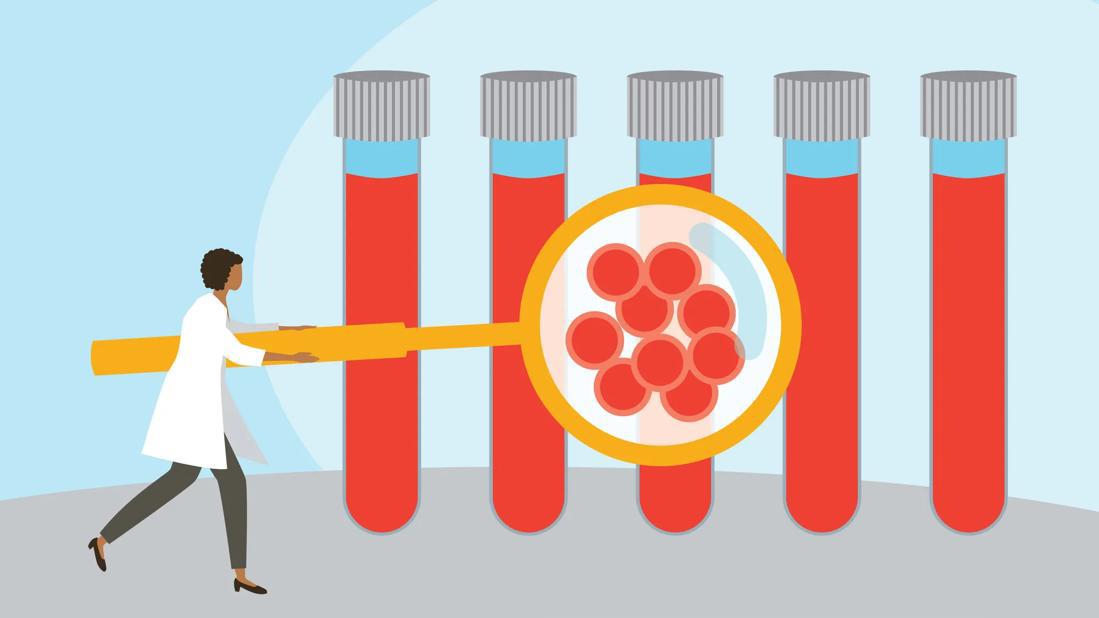What Is ‘Golden Blood’? And Why Is It So Rare?
Fewer than 50 people have ever been found to have golden blood, a genetic change that’s also called Rh null blood

If you’ve ever spent much time looking into blood types, you were probably led to believe there are eight of them: A+, A-, B+, B-, AB+, AB-, O+ and O-.
But that’s oversimplifying things quite a bit.
There are rare blood types that go beyond these best-known ones — and people with so-called “golden blood” are the rarest of the rare. (And since you're wondering, no, it’s not about blood that’s yellow or gold in color.)
Transfusion medicine physician Zaher Otrock, MD, explains what makes golden blood so special.
What is golden blood?
Golden blood is the rarest kind of blood known in the world. It’s also called Rh null blood, and about 43 people have ever been reported to have it.
"The name ‘golden blood’ can sound like this is blood that’s somehow more pure or safe for transfusions,” Dr. Otrock shares. “But that name is just a popular term to convey how rare Rh null blood is. Not that it’s in any way a ‘better’ type of blood.”
Golden blood happens because of an extremely rare genetic mutation, or change. But understanding what exactly it is takes a little understanding of the science of categorizing blood.
Let’s take a closer look.
What it means to be Rh null
Blood types are determined using the ABO and Rh (Rhesus factor) blood group systems. It goes a little something like this:
Lab tests look for A and B antigens covering your red blood cells. Antigens are particles that your immune system will attack if it’s not familiar with them.
- If you have the A antigen, your blood type is A.
- If you have the B antigen, your blood type is B.
- If you have both A and B antigens, your blood type is AB.
- If you have neither, your blood type is O.
The test also looks at your blood Rh factor. Specifically, it looks at an antigen called RhD.
- If you have RhD, you have a positive blood type.
- If you don’t have RhD, you have a negative blood type.
Now, here’s where golden blood comes in.
RhD isn’t the only antigen in the Rh system. There are actually more than 50 different Rh antigens.
People with Rh null blood, or golden blood, don’t have any of the Rh antigens.
“We test for RhD because it’s the one that’s most likely to trigger an immune reaction,” Dr. Otrock explains. “In that sense, it’s the most important and clinically significant of the Rh antigens. But it’s definitely not the only one to consider.”
Living with golden blood
Rh null blood is sometimes called a universal donor for people with rare or multiple Rh antibodies — even more flexible than O-. But it’s far harder to find.
On the flip side, it can be dangerous for people who live with golden blood to receive a blood transfusion from anyone who also isn’t Rh null.
“For people who live with Rh null blood, the best options would be to donate and freeze their blood to use in case of planned surgeries and to carefully manage things like anemia (low blood count) with measures like iron or folic acid to avoid transfusions whenever possible,” Dr. Otrock advises.
What’s the danger? Remember how golden blood doesn’t have any Rh antigens in it? Other blood types do.
O- blood doesn’t contain the A, B or RhD antigens. So, most people’s immune systems will accept it as safe.
But O- blood still contains other Rh antigens. So, if it’s donated to someone with golden blood, their immune system could mount a defense against it.
Blood compatibility depends on your immune system accepting donated blood as something that’s safe. If you receive blood that has an antigen your body doesn’t recognize, it can result in a transfusion reaction and cause issues like:
- Flu-like symptoms (including fever and chills)
- Jaundice (a yellowing of the skin)
- Back pain
- Blood in your pee
- Kidney failure
If left untreated, blood incompatibility can be life-threatening.
Golden blood is a real — and incredibly rare — part of human biology. While most people will never encounter Rh null blood, learning about it reveals just how complex and fascinating our blood, and our bodies, really are.